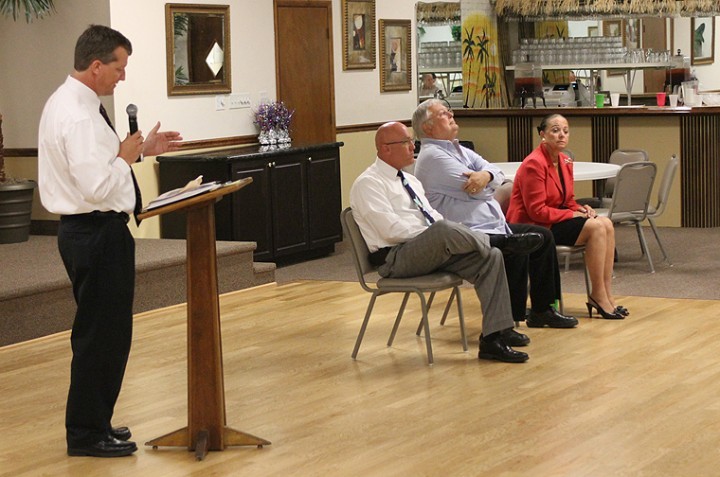INDIAN RIVER COUNTY — With all the rhetoric being hurled around about taxes, it’s ironic that this year’s contests to decide who will calculate taxable property values and collect the taxes are receiving the least attention.
The incumbents, Property Appraiser David Nolte and Tax Collector Carole Jean Jordan, are seasoned politicians who say they are running well-managed agencies and doing more with less funding. Their challengers, private property appraiser Tom Dehn and former County Commissioner Tom Lowther, both say they can do things better.
The salaries for these jobs are high by local standards. Nolte and Jordan’s jobs each pay about $118,000 per year, but Jordan voluntarily took a 5 percent pay cut this year to reduce expenses.
Most voters know little about what the Property Appraiser and Tax Collector do, and fewer and fewer deal with either office in person as most everything can be done by mail or on the web. So unless the voter has had a negative experience with the Tax Collector or Property Appraiser, if Dehn or Lowther win, that could qualify as a major upset.
Nolte said voters should keep him because they know what they’re getting.
“Proven professional performance,” he said. “I’ve done the job very well for 31 and a half years and had 33 tax rolls approved by the legislature.”
Nolte said his agency cut back as the workload has decreased, reducing his budget 30 percent since 2008. With fewer new homes and buildings to appraise, he’s cut staff and travel to get the budget down.
Responding to the criticism that he and his department are not on the cutting edge of technology, Nolte said he personally uses five computers and that “we are as technically advanced as every other (property appraiser) office in the country.”
Dehn, who has some former Nolte employees in his camp, said it’s time to give someone else a shot.
“The inherent complacency that develops naturally over a political position that someone would hold for as long a duration as my opponent, after a certain period of time, your ideas are exhausted,” Dehn said.
“A person should come into office with a qualified skill set, and I absolutely bring real-world experience and corporate management experience,” Dehn said, citing his experience as a property appraiser in the private sector and his service as a Special Magistrate for a Value Adjustment Board.
Dehn said he has identified between $250,000 and $300,000 that he could cut from the Property Appraiser budget in the first year, and has pledged to take a 15 percent reduction in his own pay if elected.
Over in the Tax Collector race, Lowther paints Jordan as a master of public relations, sometimes using educational events put on by her agency and her staff as opportunities to spread good political will for re-election.
With regard to customer service, Lowther said he can improve the flow of traffic in the Tax Collector’s office by reallocating staff to run things more efficiently. Though there’s been no public outcry about long lines for tags or driver licenses, Lowther said he’s heard frequent complaints.
Jordan said the Tax Collector’s Office has been nimble enough to take on driver’s license duties and to handle the challenges presented by the economic downturn, both on the budget side and the people side of the job.
She says the Tax Collector’s office has come in under budget and returned $12.5 million to the taxpayers – or more accurately to the Board of County Commissioners to be spent on some other need – since she took office in 2008.
“The challenge of running the Tax Collector’s office has been doing more with less and with no increase in salaries, and we’ve come under budget and have given back the excess,” said Jordan.
“We’re doing a lot more efficient job running the Tax Collector’s office and giving the savings to the customers and finding ways to do more electronically, or by mail the things that you can’t do electronically.”
If Lowther succeeds in the primary, he will have cornered the market for both inevitabilities – death and taxes. Lowther has worked in his family’s funeral home business for decades and served a term on the Board of County Commissioners.
Lowther said he would “take the politics out of collecting taxes” by removing his name from what needs to be written on checks to pay taxes. The website says checks or money orders should be made payable to “CAROLE JEAN JORDAN, TAX COLLECTOR ” – a practice that is not unique to Indian River County as Florida tax collectors have historically had checks made payable to his or her name.
Brevard County has switched to just “Brevard County Tax Collector,” but St. Lucie County still requires that checks or money orders be made payable to “Bob Davis, St. Lucie County Tax Collector.”
“It should just say Indian River County Tax Collector with nobody’s name on it,” Lowther said.

